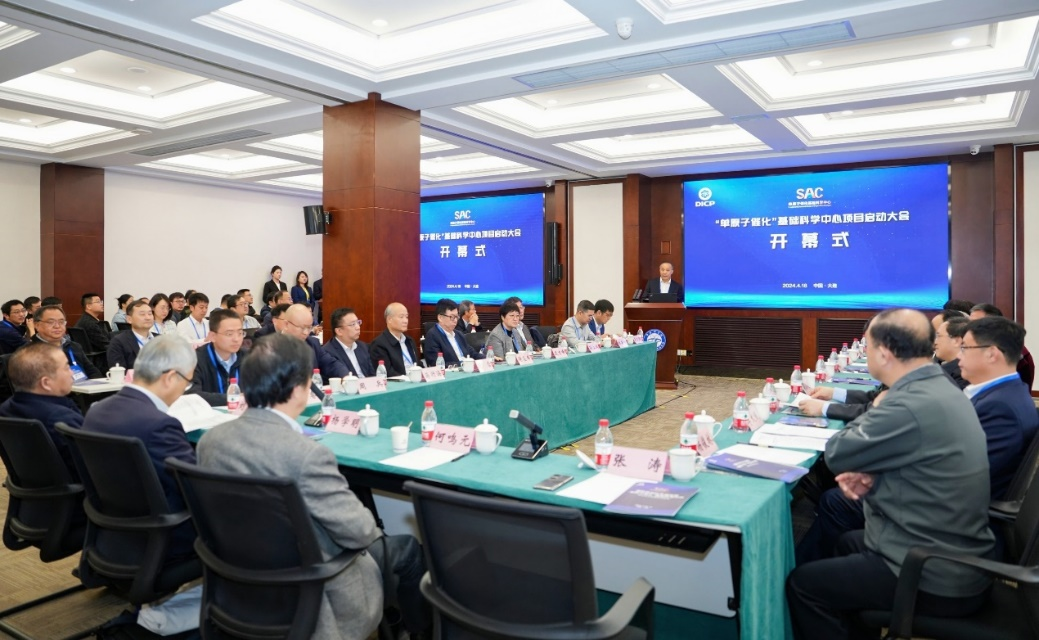From April 18th to 19th, the launching meeting of the National Natural Science Foundation of Chinese Basic Science Center for "Single-Atom Catalysis" led by our laboratory, was held at the Communication Center of our institute. This Basic Science Center is led by Academician Tao Zhang, and relevant teams from Tsinghua University and Xiamen University participated together. Academician Xueming Yang, Director of the Department of Chemical Sciences of the National Natural Science Foundation of China, Junlin Yang, Executive Deputy Director, Bing Zhou, Deputy Director of the Bureau of Frontier Science and Education of the Chinese Academy of Sciences, Rui Cai, Director of the Department of Science and Technology of Liaoning Province, Damin Li, Deputy Mayor of Dalian City, and Zhongmin Liu, Director of our institute, attended the meeting and delivered speeches.

In their speeches at the launching meeting, relevant leaders and experts stated that the concept of single-atom catalysis originally proposed by the team led by Tao Zhang internationally has triggered a boom in international catalysis research and has now become a research frontier in the field of international heterogeneous catalysis. The establishment of the National Natural Science Foundation of China's Basic Science Center for "Single-Atom Catalysis" will gather outstanding teams in the field of single-atom catalysis in China. Facing the international academic frontiers of catalysis and the major needs of China in the field of energy and chemical engineering, it will conduct systematic and innovative basic research closely around the characteristic new reactions of single-atom catalysis, dynamic reaction mechanisms, and industrial applications, form a systematic new method and new theory of single-atom catalysis, and promote the transformation of the research and development paradigm of traditional heterogeneous catalysts, providing strong technical support for the early realization of China's "dual carbon" goal. Tao Zhang, on behalf of the team of the Basic Science Center, gave a work report, introducing in detail the implementation plan and scheme of the Basic Science Center, and reporting from aspects such as the research content, research plan and objectives, management and operation mode of the Basic Science Center.
The Basic Science Center for "Single-Atom Catalysis" has appointed Academician Mingyuan He as the Director of the Academic Committee and Academician Zhongqun Tian as the Deputy Director. Twelve academicians, including Can Li, Xue Duan, Dongyuan Zhao, Xinhe Bao, Xiaoming Feng, Buxing Han, Zhongmin Liu, Zaiku Xie, Jinlong Yang, Jinghong Li, and Lifeng Chi, serve as members of the Academic Committee to provide academic guidance for achieving the goals of the Basic Science Center. At the launching meeting, Mingyuan He, Xueming Yang, Junlin Yang, Zhongmin Liu, and Tao Zhang jointly unveiled the plaque for the Basic Science Center.
After the launching meeting, a one-day academic seminar on single-atom catalysis was held. Twenty-six outstanding young and middle-aged scientists from research institutes, universities, and enterprises across the country were invited to present wonderful reports. The report contents covered multiple fields such as the preparation, characterization, theoretical calculation, and industrial application of single-atom catalysts, and the participants had in-depth discussions and exchanges.
The positioning of the Basic Science Center of the National Natural Science Foundation of China is to rely on high-level academic leaders, attract and gather outstanding scientific and technological talents. Through the long-term and stable support of the center, in the next 5 to 10 years, it will seize the commanding heights of international scientific development and form an academic highland with important international influence. (Text/Photos: Yuan Gao, Song Gao, Aiqin Wang)